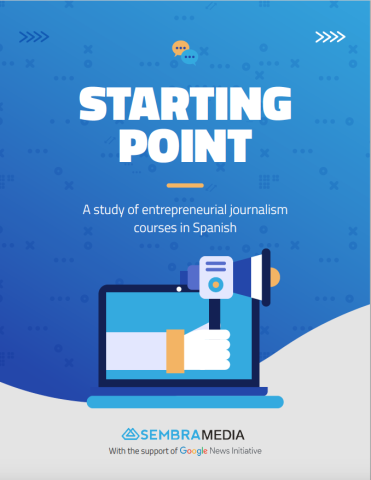
In Latin America, where news entrepreneurs are an important source of independent news, a growing number of students are interested in learning the skills to launch and sustain media startups. Yet fewer than 3 percent of the universities in Latin America that teach journalism and communications offer courses in entrepreneurship, a new study has found.
The study, “Starting Point: A study of entrepreneurial journalism courses in Spanish,” was conducted by SembraMedia, a nonprofit devoted to increasing quality content and the diversity of voices in Spanish. SembraMedia was cofounded by ICFJ Knight Fellow Janine Warner.
“We’re excited to see growing interest in entrepreneurial journalism among students and professors and we hope this study will inspire more universities to offer these kinds of courses,” Warner said. “It’s more important than ever for journalists to understand basic business and management.”
The study, supported by Google News Initiative, also found that most of the professors who teach entrepreneurial journalism in Latin America and Spain bring deep, real-world experience into the classroom. The majority have more than a decade of teaching and working in media, and most have launched their own projects or startups.
A team of researchers led by Patricio Contreras, a professor at Universidad Alberto Hurtado in Chile, identified and surveyed 59 professors (48 in Latin America and 11 in Spain) who teach entrepreneurial journalism in Spanish. The team conducted in-depth interviews with 25 of them.
SembraMedia today published the English translation of the study, after launching it in Spanish last month. The study sparked so much interest from news entrepreneurs that SembraMedia is helping launch a network of entrepreneurial journalism professors keen on strengthening teaching practices in Latin America and Spain by sharing resources and best practices.
By helping universities bolster their entrepreneurship offerings, SembraMedia hopes to empower a new generation of journalists ready to lead independent media organizations.
“Our goal is to help these journalist-led media organizations have greater impact," said SembraMedia Managing Director Mijal Iastrebner, "and we believe collaborating with universities in Latin America, the United States and Spain, is key."
Read the study in English or Spanish.
Jennifer Dorroh is director of the ICFJ Knight Fellowships.